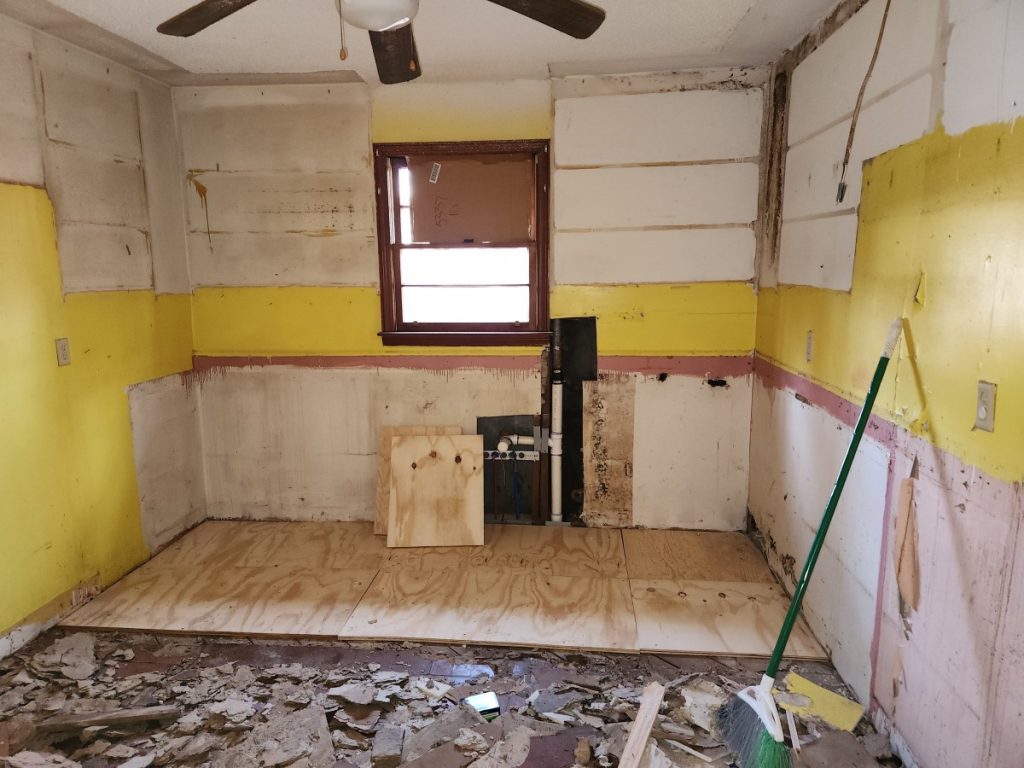Do I need a contractor’s license to flip houses? No.
Do you need a real estate license to flip a house? No.
Do you need a business license to be a house flipper? No.
Do you need an LLC to flip a property? No.
You should always check with your local planning and zone boards, but generally, you don’t need a license or business structure to flip a house. I’ve been flipping houses for over 15 years and don’t have any licenses. I do have an LLC, but I only formed that business once I had been investing for a few years.
License Requirements
You do not need a license to flip a house. You don’t need a contractor’s license, a real estate license, or a business license.
Real estate investing is the purchase of real property with the intention of making a profit; it’s not doing construction work. Real estate investors should hire professional contractors to handle the work that needs a license. That being said, if the property investor insists on doing the renovation work themselves, there is often a licensing exclusion for property owners working on their own properties.
The legal requirements vary from city to city, so you should check the local rules.
Contractor’s License

In most cases, you don’t need a contractor’s license to flip houses.
What is a Contractor’s License?
A Contractor’s License is a permit that allows a contractor to perform certain types of construction services. The license requirements vary by state but typically include proof of experience, education, and financial stability. In some states, contractors must also pass an exam.
Who needs a Contractor’s License?
Contractors need a license to perform any construction work involving a building permit.
Below are some of the work that requires a contractor’s license:
- Electrical work
- Plumbing
- Building a new home
- Renovating a kitchen or bathroom
- Adding a deck or patio
- Roofing a home
- Plumbing
Why Don’t I need a Contractor’s License to Flip a House?
Ordinarily, you don’t need a contractor license to flip a house. However, you may need building permits to do specific jobs. These permits must be posted at the job site, and a county home inspector will often inspect the work. In most counties, a licensed general contractor or the homeowner can pull a permit.
Contractor’s License: It’s your Property
The second reason a house flipper does not need a contractor’s license is that they own the property being flipped. In most states, you do not need a license to perform work on your property, but this may not apply if you own the property through an LLC. Keep in mind that some jobs, such as HVAC and electrical work, will require a license to purchase the materials.
Contractor’s License: Don’t Do the Work
The first reason that home flippers do not need a contractor’s license to flip a house is that they should not be doing the work. The home improvement contractor is the individual that needs this type of license. This license may be required for a larger construction project and is often required to get the necessary permits. You don’t need a contractor’s license if you are not doing the work yourself.
There are many reasons you shouldn’t want to do the renovation yourself. You should always hire a contractor to do your renovations. In most cases, it’s a good idea to hire a licensed contractor to help protect you from fraud and shoddy workmanship.
The best place to get information on the proper license in your state is at the National Association of State Contractors Licensing Agencies (NASCLA).
Real Estate License

Typically, flipping houses does not require a real estate license.
What is a Real Estate License?
A real estate license is authorization that allows a person to act as a real estate broker or an agent. It is issued by the state government and must be renewed periodically. To obtain a real estate license, a person must meet specific requirements, including passing an exam and completing a certain amount of education hours.
Who Needs a Real Estate License
A real estate license is required for anyone who wants to act as a real estate agent or broker. This includes people who perform the following activities:
- Buyer’s agent. Helps property buyers find sellers for their property.
- Seller’s agent. Helps property sellers find potential buyers for their property.
- Property Manager. Works with property owners and renters to manage rental properties.
Some real estate agents are Realtors. A Realtor is a real estate agent who is a member of the National Association of Realtors (NAR). NAR is the largest trade association in the United States, with over 1.5 million members. To become a Realtor, an agent must be a member of NAR and must abide by the NAR’s Code of Ethics.
Why Don’t I need a Real Estate License to Flip a House?
Real Estate License: Own the House
The first reason that house flipping does not require a real estate license is that the flipper is not representing someone else when buying or selling the property. When buying and selling a home, they act in their own interest as either the buyer or seller. You don’t need a real estate license to buy or sell a house when it’s your own home.
Real Estate License: You Should Delegate this Work
The second reason that home flips do not require a real estate license is that the property owner should not be doing this work themselves. You don’t need a real estate license when you delegate this work to a licensed real estate agent.
Finding and vetting buyers and sellers is hard work. It’s almost a full-time job requiring a significant amount of time. A real estate investor’s time is better spent searching for a real estate investment. The best way to flip a house is to let a professional familiar with the local real estate market list properties on the multiple listing service (MLS), vet buyers and sellers, and guide everyone through the entire process.
A licensed agent can dedicate more time to selling a renovation project, which may increase profit margins. This is a great way to free up house flippers to find future flip projects. As a bonus, a successfully flipped house shows an agent you are serious, and they may start bringing you deals.
Real Estate License: It’s Better Not to have a License
A licensed real estate agent is subject to many regulations, making it challenging to flip houses profitably. In some states, it is illegal to represent both the buyer and the seller, which is what a house flipper would be doing if they listed their house for sale. In addition, the code of ethics for the National Association of Realtors requires certain disclosures when a real estate licensee has an interest in the property being sold. These disclosures may be burdensome for a property flipper.
Business License

Generally, you don’t need a business license to flip houses.
What is a Business License?
A business license is a permit issued by a government agency that allows a business to operate within its jurisdiction. Depending on the type of business, additional licenses and permits may be required.
Who Needs a Business License?
In general, businesses that do not require a business license do not engage in activities that the government regulates at the local, state, or federal level. For example, businesses that operate solely online and do not have a physical presence may not need a business license. Similarly, companies that are operated as sole proprietorships, where the owner is the only employee, and there is no separate legal entity, may not need a business license. However, it’s important to note that requirements for business licenses vary by jurisdiction, so it’s always a good idea to check with the local government where the business is located to determine whether or not a license is required.
Why Don’t I need a Business License to Flip a House?
Flipping a house in your own name will not require a license. With your first property, or when flipping houses as a side hustle, you should start in your name and perfect the business place. When forming a business to perform the house-flipping venture, you may be required to get a local business license. In most areas, a business license is optional for a house flipping business, but you should check with your local planning and zoning board.
Is an LLC Required

An LLC is not required to flip a house. In fact, no business structure is needed to be a house flipper. However, if you are flipping houses on an ongoing basis, it’s best to do it within a business entity.
What is an LLC?
A limited liability company (LLC) is a business structure that combines the pass-through taxation of a partnership or sole proprietorship with the limited liability of a corporation. An LLC is not a corporation under state law; it is a legal form of a company that provides limited liability to its owners in many jurisdictions. LLCs are well known for their flexibility to business owners; depending on the situation, an LLC may elect to use corporate tax rules instead of being treated as a partnership.
Other Business Entities
Below is a list of business entities that may be suitable for flipping houses:
Sole proprietorship
A sole proprietorship is a business owned by an individual. The owner is personally liable for the debts and liabilities of the company. Sole proprietorships are easy to set up and operate and are the simplest form of business entity.
Partnership
A partnership is a business owned by two or more people. The owners are personally liable for the debts and liabilities of the company. Partnerships are more complex than sole proprietorships, but they offer the advantage of sharing profits and losses with other people.
Corporation
A corporation is a legal entity that is separate from its owners. The owners are not personally liable for the debts and liabilities of the corporation. Corporations are the most complex type of business entity, but they offer the advantage of limited liability for the owners.
S Corporation
An S corporation is a type of corporation that elects to be taxed under Subchapter S of Chapter 1 of the Internal Revenue Code. This means the corporation’s income and losses are passed through to its shareholders, who report them on income tax returns. The shareholders must then pay taxes on the gain or loss at their individual income tax rates. This allows S corporations to avoid double taxation on corporate income.
Limited liability company (LLC)
An LLC is a hybrid between a partnership and a corporation. The owners are not personally liable for the debts and liabilities of the LLC, but they are taxed like partners. LLCs are easy to set up and operate, offering the advantage of limited liability for the owners.
Which Business Entity is Best for Flipping Houses?
In order to flip houses, a real estate investor does not need a business entity. Houses can be flipped in an individual’s name. However, in some cases, the house flipper may decide to flip houses within a business structure.
Deciding the best structure to use when flipping houses is complex. An LLC is one of the most popular business structures for a house-flipping business, but other options are available. Before forming your business structure, seek advice from a Certified Public Account (CPA), tax expert, or attorney who will factor in your unique situation.
Why Don’t I need an LLC when Flipping Houses?
An LLC’s main benefit is protecting personal assets in the event of a lawsuit. When the house is in an LLC name instead of your own, the liability protection of an LLC means that only the business assets are at risk in a lawsuit. For this reason, in most cases, your maximum loss is limited to the purchase price and renovation cost, not your personal assets. However, the risk of a lawsuit is low, and it’s just the type of thing general liability insurance covers.
The tax benefits of an LLC are minimal. All tax deductions are available to an LLC and an individual, often using schedule C. In the case of a single-member LLC, everything flows to the individual tax return, and the real estate business isn’t required to file a return.
If you decide to use an LLC for your flip business, you should know that it protects against personal liability, but it isn’t guaranteed to protect the LLC members. Piercing the corporate veil is a legal doctrine that allows courts to hold shareholders or directors personally liable for the corporation’s debts or obligations. This is done when the court finds that the corporation is being used as a sham or alter ego of its shareholders or directors and that they are using the corporation to avoid personal liability.
Conclusion
It’s the right choice for real estate investors to hire professional contractors to handle any work that requires a license. If the property investor insists on doing the renovation work themselves, there is often a licensing exclusion for property owners working on their properties. In addition, a house flipper should not be doing the manual labor themselves, and they own the house, so in t the rare event a license is required, hire a licensed contractor.
A real estate license is not required to flip houses, and working with buyers and sellers is a lot of work. Delegate this work to a licensed real estate agent who can also help you find properties to flip. They can also help you with the necessary paperwork and disclosures. Flipping homes typically do not require a real estate license. The best option when home flipping is to delegate the home sales to someone with extensive real estate knowledge.
It’s always advisable to check with local planning and zone boards, as legal requirements vary from city to city.
Stop procrastinating! The first step is to find the right property at the right price. Once you do that, flip it! If you need help, check out my guide to property flipping.




